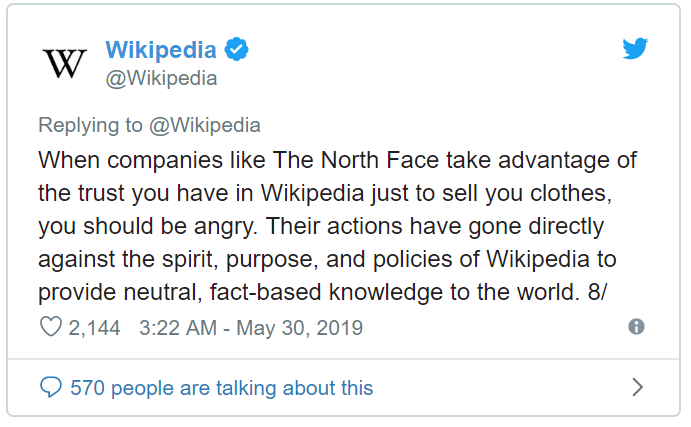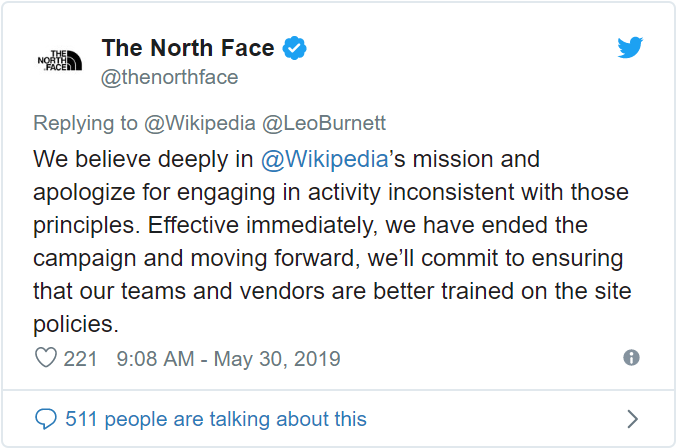Risk and Results — A Game of Reputation Roulette
In June of this year, The North Face got into some hot water in the SEO world. They were found tampering with Wikipedia in order to keep the brand as the top result on Google Images search. They executed the campaign alongside Brazilian ad agency Leo Burnett Tailor Made. Such tampering didn’t go unnoticed, and the backlash was a mighty one in certain circles.
The SEO faux-pas has certainly shined a spotlight on agency practices. It begs the question: Are awards and short-term SEO results worth risking a brand’s reputation?
Guarding the ivory tower: is it worth it?
An agency’s job is to deliver results to the best of their capabilities, that much is true. But within the realm of digital marketing and SEO, a fine line is drawn between values and bottom lines. Agencies and businesses both should never compromise their values for the sake of a quick boost in hits and numbers.
In The North Face’s case, they tampered with Wikipedia by replacing images of Brazilian landmarks to include product placements so they could climb the ranks of Google. Not only was this a violation of Wikipedia’s rules of advertising, marketing, PR, and self-promotion, but the brand seemed unapologetic about it. When called out on their blatant act, the business at first claimed it was a “collaboration effort” with Wikipedia. It didn’t help their cause that the campaign’s promotional video specifically addressed the fact that they “hacked” Wikipedia and got their advertising by “paying absolutely nothing”. When Wikipedia publicly denied the collaboration on Twitter, The North Face backpedalled quickly, but the damage was already done.

The last of eight tweets Wikipedia made on the thread neatly summarised the issue. Unfortunately, The North Face’s apology thereafter came off as something little more than an afterthought.

A game of self-jeopardy
The overarching backlash against the brand and their campaign likely wouldn’t have been so intense had The North Face not flaunted their actions. Many who saw the video and read through Wikipedia’s extensive Twitter thread about it were outraged at the flagrant disregard for ethical conduct that The North Face seemed to show.
The campaign not only brought into question the credibility of The North Face, but Leo Burnett Tailor Made and Wikipedia as well. The North Face taking a stance of unapologetic SEO manipulation for a quick boost in their Google ranking reflected just as much on the SEO agency they employed for it.
The language used in the video about their “biggest obstacle” was manipulating the site “without attracting attention [from] Wikipedia moderators” was also problematic. The North Face introduced the campaign like a successful heist, not a collaboration.
In this case, The North Face took responsibility for their brand image a little too literally and in entirely the wrong way.
Credibility at stake
When an SEO agency like Leo Burnett Tailor Made executes a controversial campaign like this, the question often asked is — why? As an agency of such a reputation, it was likely that they knew the campaign would fail. And if they didn’t know, it then calls into question their own expertise and code of ethics as a business. It compromises the reputation of Leo Burnett Tailor Made and its future relationships with its potential clients.
Leo Burnett Tailor Made’s team dropped the ball by not looking further into the protocols that govern Wikipedia’s image use and replacement.
In the race to the bottom for SEO, it’s a matter of choosing to play the long game or to focus efforts on short-term results (which, as we have seen, may backfire). A brand needs longevity in its approach and a story worth sharing through the ages.
After all, a brand only has its reputation.